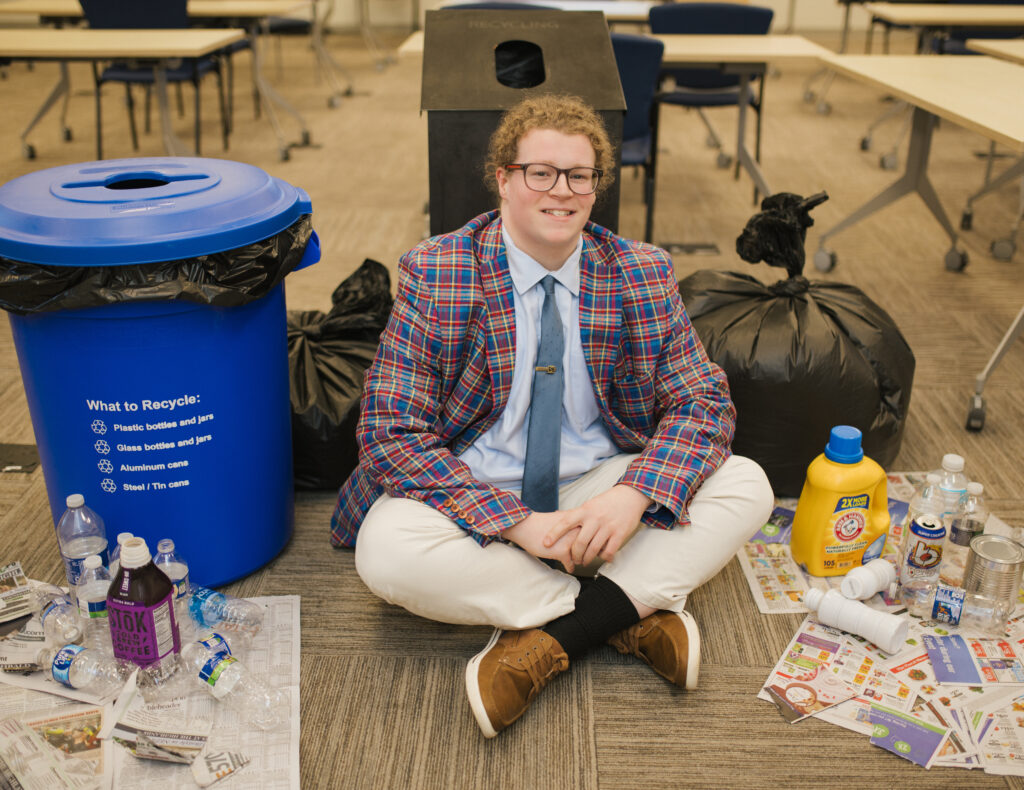‘Something that makes a difference’
The Wright Center focuses on environmental, social, and governance issues with new hire
Since high school, John Slater’s interest in science has spanned the heavens and Earth.
A chance conversation with his longtime family doctor, Linda Thomas-Hemak, M.D., FACP, FAAP, set the Covington Township, Pennsylvania native on a career path as an environmental, social, and governance (ESG) specialist at The Wright Centers for Community Health and Graduate Medical Education.
After Slater, 23, graduated from Colgate University with a degree in physics and astronomy with minors in geography and economics, he contemplated pursuing graduate school or applying for an internship with NASA – but he couldn’t shake the idea of somehow getting involved in the fight against climate change.

“It’s the most significant issue of my lifetime,” he says. “I want to make sure I am doing the right thing, something that makes a significant difference.”
At an appointment with Dr. Thomas-Hemak, who has treated four generations of his family and serves as the president and CEO of The Wright Centers for Community Health and Graduate Medical Education, he mentioned his background and job search. She shared her interest in getting The Wright Center more involved in environmental issues.
“She said, ‘Maybe you can help us build that,’” Slater says. “It wasn’t something I expected. I was surprised that it just fell together like that.”
The concept of ESG got its start in the 1960s as venture capital companies began focusing on investing in sustainable businesses, including examining a company’s impact on the environment, how it treats employees, customers, and stakeholders, its management practices, and more. Since joining The Wright Center in January 2023, Slater has embarked on an educational journey, learning more about how ESG is relevant to The Wright Center’s mission. Along the way, he’s starting conversations with employees across the organization to spotlight ESG concepts and gather input.
“He’s building something from the ground up,” says Jennifer Walsh, Esq., senior vice president of enterprise integrity, executive counsel, and chief governance officer. “He’s really taking the initiative, and in the national realm, he’s already emerging as a leader.”
One of Slater’s first big successes came just a few weeks into his role. Every five years, the U.S. Global Change Research Program (USGCRP) issues a National Climate Assessment. Before the next one is released by the end of 2023, the government published some findings and asked stakeholders for feedback. Slater submitted a response, which is under review by USGCRP officials.
“It was a nice win to get a piece of my writing out there and say, from the perspective of The Wright Center, here’s what’s missing,” Slater says.
Another big win this year is The Wright Center’s recent acceptance as a network organization into the National Academy of Medicine’s Action Collaborative on Decarbonizing the U.S. Health Sector, a public-private partnership of leaders from across the health system committed to addressing the sector’s environmental impact while strengthening its sustainability and resilience.
Now, Slater is focusing on how to better prepare The Wright Center to meet environmental challenges that impact community health, whether it’s a systemic problem – increased asthma in neighborhoods near busy highways – or a natural disaster, such as a flood or a tornado.
“One of the common sayings in the environmental field is, those who contribute the least to climate change are harmed the most,” he says. “Environmental justice and its impact on climate resilience is an issue I’ve been working with a lot recently. Basically, once a climate-related event happens, how do we respond and do so equitably?”
Strengthening relationships with stakeholders outside of The Wright Center – from first responders and county emergency management agencies to churches, social services, and other medical providers – is part of that goal. Gathering input from community members and employees is important too, Slater notes.
“One of the tenets of ESG is that you don’t go around making changes in a system without gathering input first,” he says. “The changes should be driven by the opinions and the needs of the people in the system itself.”
Slater’s second goal is to publish a report, maybe as early as mid-summer, to define how The Wright Center is focusing on ESG topics and measure its early success.
“Having a document that shows, here’s where we are and here’s where we’re going – it’s important,” he says. “We’ll be tracking our emissions, our waste, our diversity and inclusion, patient satisfaction, even our employee turnover rate.”
Walsh says measuring The Wright Center’s progress on a myriad of ESG initiatives is crucial to positioning the nonprofit enterprise as a leader both locally and in the national health care arena. Health centers’ environmental impact is a growing focus among federal officials. The federal government established the Office of Climate Change and Health Equity in 2021 to examine how the environment impacts Americans’ health. Meanwhile, health centers across the country are signing on to the Health Sector Climate Pledge, a voluntary commitment to cut their greenhouse gas emissions by 50% by 2030 and achieve net zero emissions by 2050.
“We want to change the fundamental way The Wright Center approaches everything in these domains. Measuring that progress will reflect how we’re maturing and improving,” Walsh says. “Building the platform is the starting point.”








